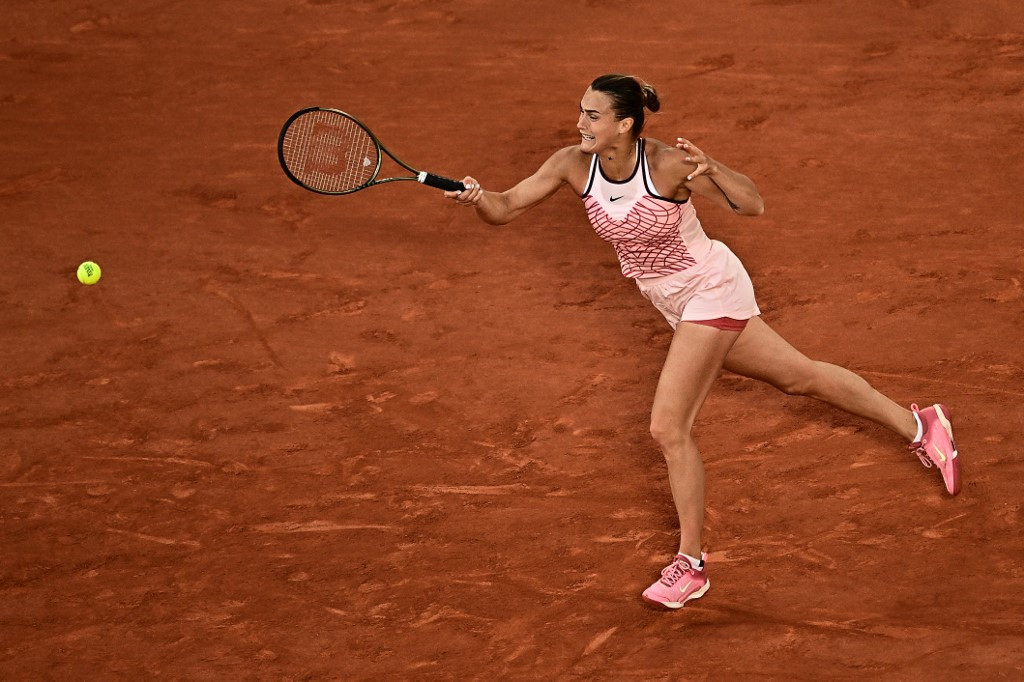PARIS:
Aryna Sabalenka of Belarus moved into a politically-charged French Open quarter-final with Ukraine’s Elina Svitolina on Sunday and immediately set the tone for the high-profile confrontation by boycotting Roland Garros media for a second time.
Australian Open champion and world number two Sabalenka defeated Sloane Stephens 7-6 (7/5), 6-4 to reach the last eight in Paris for the first time.
Tuesday’s clash will be the third meeting between Sabalenka and Svitolina but first since Russia’s invasion of Ukraine last year. Belarus is a key military ally of Moscow.
Svitolina has played two Russians so far at the tournament and refused to shake hands with both in protest at the war.
Sabalenka defeated Svitolina’s Ukrainian compatriot Marta Kostyuk in the opening round last weekend.
Kostyuk’s decision also not to shake hands brought her a chorus of boos from the Paris crowd. Kostyuk said the spectators who jeered her should be “embarrassed”.
After beating Stephens on Sunday, it was announced that for the second match in succession Sabalenka would not appear at a post-match news conference.
She boycotted her last scheduled press conference on Friday after defeating Kamilla Rakhimova in the third round.
She claimed she “did not feel safe” when previously questioned about the war and her relationship with Belarus president Alexander Lukashenko.
“Aryna Sabalenka will not be doing a general press conference tonight,” said the organisers in a statement.
“An interview with a WTA editorial reporter will be conducted shortly and transcribed and distributed.”
Not surprisingly, the delicate question of a Belarus v Ukraine clash was avoided in a bland, official handout provided by organisers.
Sabalenka limited her comments to her expectations for Tuesday’s match, pledging to show “my best tennis”.
After her first two rounds, Sabalenka had fended off a series of tough questions over her individual stance on the war as well as links to the government in Belarus.
On Wednesday she was asked why in 2020 she “signed a letter to support Lukashenko” when “he was torturing and beating up protestors” in the street.
“I have no comments to you, so thank you for your question,” she replied.
Earlier, Svitolina, playing her first Grand Slam since becoming a mother, reached the quarter-finals for the fourth time.
The Ukrainian defeated Daria Kasatkina 6-4, 7-6 (7/5) for a seventh win in seven meetings against the Russian who was a semi-finalist last year.
Despite not shaking hands, Kasatkina still gave her rival a friendly thumbs-up.
Svitolina had described Kasatkina as “brave” for supporting the decision by British tennis authorities to provide all Ukrainian players with two hotel rooms throughout the forthcoming grass court season peaking at Wimbledon.
“Definitely I acknowledged the match today. Really thankful for her position that she took,” said Svitolina on Sunday.
“Yeah, she’s a really brave person to say it publicly, not so many players did.”
Svitolina said that she will not be shaking the hand of Sabalenka when they meet on Tuesday.
“I have played last two matches against Russian players so it will not change, everything will be the same,” she said.
“So I’m used to it now, it’s going to be the same.”
In marked contrast to Sabalenka, the 28-year-old Svitolina insisted that post-match press conferences have provided her and other Ukrainian players with a vital public platform.
“To have a press conference is a great thing. Players are sharing some moments that they have on the court, off the court,” she said.
Svitolina’s charge to the quarter-finals has caught the imagination at home.
“It’s the story about self belief… it’s a story about bravery… story about courage… Well deserved @ElinaSvitolina, thank you for giving Ukraine a reason to celebrate,” tweeted former ATP Tour player Sergiy Stakhovsky.

